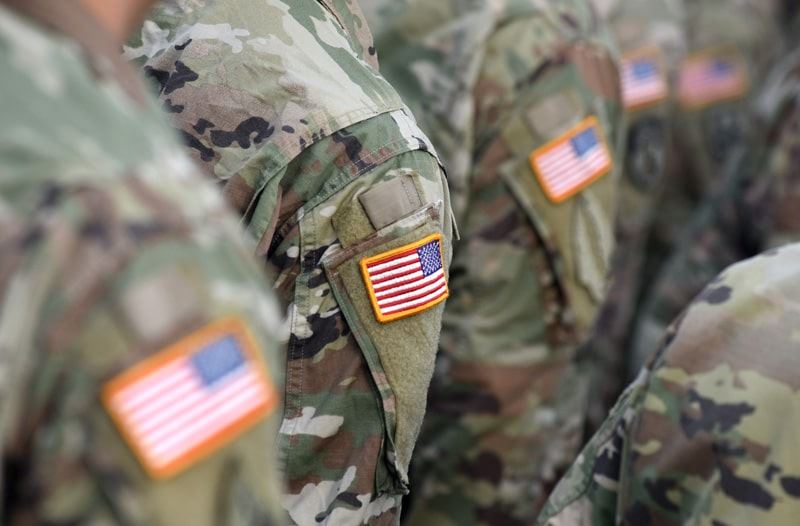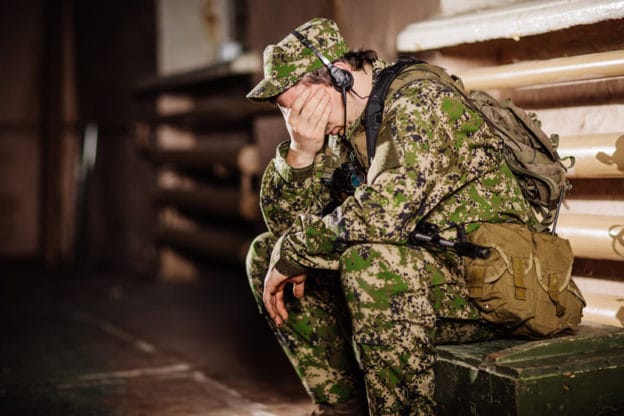The Unique Struggles Of Veterans
 Veterans are people who completed service in any branch of the military
and received a discharge that was anything other than dishonorable. The
VA has other specific criteria for defining veterans who qualify for benefits.
Most veterans served overseas, and many were involved in combat. Watching
or experiencing physical trauma is a common reason why veterans develop
mental health disorders and SUDs. In addition to trauma from injuries, some veterans experience sexual
assault. This is more common among women.
Veterans are people who completed service in any branch of the military
and received a discharge that was anything other than dishonorable. The
VA has other specific criteria for defining veterans who qualify for benefits.
Most veterans served overseas, and many were involved in combat. Watching
or experiencing physical trauma is a common reason why veterans develop
mental health disorders and SUDs. In addition to trauma from injuries, some veterans experience sexual
assault. This is more common among women.
Homelessness is another struggle that veterans are more likely to face.
In one survey, 44% of veteran respondents experienced a day or more of
homelessness recently. When veterans return from an environment of high-risk
combat and trauma, they normally have difficulty returning to normal life.
Some even report feeling uncomfortable enough trying to live a normal
life again that they prefer being deployed. People who have not served
in the military cannot fully understand the feelings they have, their
experiences, and their struggles.
When veterans develop mental health issues or SUDs because of their experiences,
they may be unable to keep jobs. Losing a job, paying more to feed an
addiction and financial mistakes often leave veterans homeless. Although
the VA has programs for homeless veterans, many veterans do not seek help.
Why Veterans Often Develop Mental Health Disorders
Whether they experience homelessness or not, many veterans also have frequent
nightmares and intrusive thoughts. These often lead to mood disorders.
When veterans return from deployment and face the unique struggles of
trying to readjust to normal life, they may not seek counseling. They
may experience feelings of anger, resentment, and a wide range of other emotions.
Veterans often do not feel like talking about their experiences to the
people around them. Family members do not understand, and they may not
want to risk feeling judged or receiving well-meaning but unhelpful advice.
Although they may feel like talking to the friends they were deployed
with, they still may not feel like discussing mental health issues or
concerns. As negative emotions worsen, mental health issues can develop
and worsen.
Common Mental Health Disorders Among Veterans
Research shows that many people have untreated mental health disorders
before they enter the military. As a result, the disorders intensify in
severity by the time they return from deployment. Although this is not
applicable in all cases, it may be an issue for some. In addition to substance
use disorders, several mental health disorders are especially common among
veterans. These include depression, anxiety, PTSD, schizophrenia, and
bipolar disorder.
PTSD
Post-traumatic stress disorder can happen to anyone who witnesses or experiences a traumatic event. Symptoms
may include:
- Nightmares
- Severe anxiety
- Hypervigilance
- Flashbacks
- Hallucinations
- Irritability
PTSD symptoms may be worse in certain situations or locations. Traumatic
events may include rape, terrorism, war, an accident, or something else.
In the past, PTSD in veterans was often called “shell shock.”
Today, medical professionals have a better understanding of PTSD, its
complexities, and how to treat it effectively. PTSD is one of the most
common disorders among veterans that leads to SUD development. Women are
twice as likely to develop PTSD, which means that this is especially concerning
for female veterans.
Depression
Depressive disorder can happen to veterans during training or deployment, and it can even
develop years after returning and retiring. These are some common depression
symptoms in veterans:
- Continual sadness
- Feelings of hopelessness
- Perpetual sleepiness or sleep disruptions
- Weight changes
- Lack of energy
- Withdrawal from normal activities
Untreated depression can become severe and may lead to suicidal thoughts
or frequent thoughts about death. It is important to seek help as soon
as possible after symptoms appear.
Anxiety
People in the military often experience a frequent state of the “fight
or flight” response. Even in situations where they train extensively,
they may react in different ways. Continually being in a state of high
stress can lead to
anxiety. Some common symptoms of anxiety may include:
- Feeling out of breath
- Restlessness and difficulty concentrating
- Twitching
- Clammy hands
- Racing heartbeat
- Feeling dizzy or nauseous
- Sleep disruptions
Professionals teach veterans how to identify their anxiety causes, practice
mindfulness or other techniques, and cope with situations that cause anxiety.
Schizophrenia
One of the most common ideas that people associate with schizophrenia is
paranoia. Since veterans who were deployed know what it feels like to
know that they are being watched or pursued, it is easy to see how schizophrenia
can develop. These are some symptoms of schizophrenia in veterans:
- The feeling of being watched
- Delusions
- Hallucinations
- Difficulty concentrating
- Withdrawing from outside interactions
- Confusion
- Trouble concentrating or remembering
Therapists can help veterans identify the reasons why they experience these
unpleasant symptoms. They can also teach them strategies to change thought
patterns and behavioral reactions.
Bipolar Disorder
Bipolar disorder differs from some other mood disorders since it is cyclical.
It includes cycles of mania or hypermania with cycles of depression. When
a person is in a manic state, there may be euphoric feelings, more energy,
and racing thoughts. People may spend excessively, be more promiscuous
or behave in ways they normally would not behave. During episodes of depression,
they experience a crash from the euphoric feelings and suddenly feel sleepier,
hopeless, and less sociable. These are some symptoms of bipolar disorder
in veterans:
- Sleep changes
- Extreme mood swings
- Withdrawal from social activities
How Veterans Develop Substance Use Disorders
 Veterans with substance use disorders are between 65% and 75% more likely
to receive diagnoses of mood disorders. As they reintegrate into civilized
society and experience the negative effects of mood disorders, they may turn to
alcohol or
drugs to cope instead of reaching out for help.
Veterans with substance use disorders are between 65% and 75% more likely
to receive diagnoses of mood disorders. As they reintegrate into civilized
society and experience the negative effects of mood disorders, they may turn to
alcohol or
drugs to cope instead of reaching out for help.
They are used to being the heroes and helping others, and asking for help
for what they may be struggling with can feel impossible to them. Injuries,
surgeries, limb loss, disability, or other physical problems only exacerbate
the negative effects of mood disorders. Veterans who develop SUDs often
need dual diagnosis treatment for co-occurring mental health issues.
Finding Alcohol And Drug Rehab For Veterans In Memphis
If you are a veteran struggling with addiction or have a loved one who
needs help, Grace Land Recovery is here for you. We are sensitive to the
unique needs of the heroes who serve our country, and we strive to give
them the highest level of compassionate care possible.
Our professionals treat the unique needs of each veteran and teach them
the most effective strategies for coping with mental health issues and
beating addiction.
To learn more about alcohol or drug rehab for veterans in Tennessee, please
contact us today.




 Veterans are people who completed service in any branch of the military
and received a discharge that was anything other than dishonorable. The
VA has other specific criteria for defining veterans who qualify for benefits.
Most veterans served overseas, and many were involved in combat. Watching
or experiencing physical trauma is a common reason why veterans develop
Veterans are people who completed service in any branch of the military
and received a discharge that was anything other than dishonorable. The
VA has other specific criteria for defining veterans who qualify for benefits.
Most veterans served overseas, and many were involved in combat. Watching
or experiencing physical trauma is a common reason why veterans develop
 Veterans with substance use disorders are between 65% and 75% more likely
to receive diagnoses of mood disorders. As they reintegrate into civilized
society and experience the negative effects of mood disorders, they may turn to
Veterans with substance use disorders are between 65% and 75% more likely
to receive diagnoses of mood disorders. As they reintegrate into civilized
society and experience the negative effects of mood disorders, they may turn to



